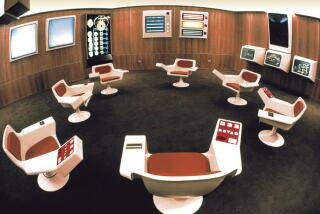What Do the Soviets Want in Latin America? Economic Gain, Not Ideological Dependency
- Share via
Soviet Foreign Minister Eduard A. Shevardnadze completes his tour of Latin America today, the first by a senior Soviet figure in more than a decade, and its implications are grist for speculation. He did not stop in Nicaragua, or in Cuba. He talked economics more than politics, and barely created a wave.
Moscow does not recognize Ronald Reagan’s latter-day Monroe Doctrine. Nor did it recognize the original when the czar received a copy. But in practice, unlike the heady days of the Cuban revolution and its aftermath, Moscow gives it due attention. Ever since the election of Salvador Allende, the Marxist president of Chile, in 1970, Moscow has been playing it cool in Latin America. And since the Nicaraguan revolution it has become even cooler, reaching the point a couple of months ago when it briefly suspended oil supplies to the Sandinistas.
Some will find this argument disingenuous. After all, the Soviet Union’s close ally, Fidel Castro, has trained or assisted anti-government guerrillas in Venezuela, Colombia and El Salvador, and has been the prime supporter of the Sandinistas.
Nevertheless, the overwhelming body of evidence shows that Moscow itself has tread exceedingly cautiously. Whatever ambiguities existed in the past, both Mikhail S. Gorbachev and his predecessor, Yuri V. Andropov, made it clear to Castro that military support should not go to guerrilla groups where governments have been lawfully elected, and that in the case of Nicaragua the amount of military aid should be carefully calibrated so that it does not appear to make the United States feel vulnerable. There never has been, in Moscow’s thinking, any chance of supplying Nicaragua with sophisticated MIGs, much less missiles, and Moscow has become increasingly concerned about the heavy-handed tactics of the Sandinistas. Shevardnadze could not emphasize enough to his Latin American hosts how much he supported the Central American presidents’ peace plan.
Moscow’s interest in Latin America has long been essentially economic. Today it is even more so. Shevardnadze was angling for a fishing agreement in Uruguay and for closer links with Brazil’s blooming computer industry. Nicaragua has little to offer the Soviet Union; its sugar, coffee and cotton all duplicate Cuba’s exports, so any intimate relationship would be even more expensive than the already costly Cuba.
Moscow could be seen to be making these kinds of calculations as far back as the early 1970s. While the anti-communist regime of Juan Peron in Argentina was wooed with credits, the newly elected leftist regime of Allende in neighboring Chile was relatively shunned.
The Soviet Union is self-sufficient in Chile’s main export, copper, while it has long eyed Argentina’s grain surplus. So Allende sought large-scale credits from the Soviet Union and was rebuffed, while Peron was given 14 long-term trade and economic agreements with Moscow. And the relationship continued to flourish after the fall of the Peronist regime through the dark ages of succeeding military governments. Moscow shielded Argentina from Western attacks in the United Nations on its human-rights performance. It reaped its reward when President Jimmy Carter embargoed grain exports to the Soviet Union following its invasion of Afghanistan. Argentina worked hard to fill the grain gap. Ironically, one of the sore points that Shevardnadze had to deal with on this trip was why Moscow has switched to American grain again. The simple answer is that it is subsidized and therefore cheaper.
There is a limit to Moscow’s purse, and this is why Latin America has continued to remain at the bottom of Moscow’s priorities in the Third World. Asia is closer and more clearly important. Africa is cheap and more easily manipulated--or so it was thought, probably wrongly. But Latin America is far away, highly sensitive to the United States’ closest interests and too economically developed for low-cost solutions.
If there is a question wide open in Latin America, it is Castro’s future under Gorbachev. Castro is now 60, very set in his ways and visibly at odds with Gorbachev’s economic reforms. Recently Moscow raised the price of the subsidized oil that it sells to Cuba. It was a shot across the bow, and, after a series of long meetings with Soviet officials, Carlos Rafael Rodriguez, Castro’s economic right hand, was compelled to admit to “flaws, which we are willing to overcome.”
Castro will feel more of this economic squeeze as Moscow persists with questions about Cuba’s capacity for relative self-sufficiency.
At one time Castro was the kind of flag that Moscow wanted to wave in Latin America. Not anymore. Sure, Moscow wants friends, but above all it wants assets--economic partners that reciprocate Moscow’s interests and avoid expense-making trouble. Fidel Castro and Daniel Ortega are yesterday’s men.
More to Read
Sign up for Essential California
The most important California stories and recommendations in your inbox every morning.
You may occasionally receive promotional content from the Los Angeles Times.













